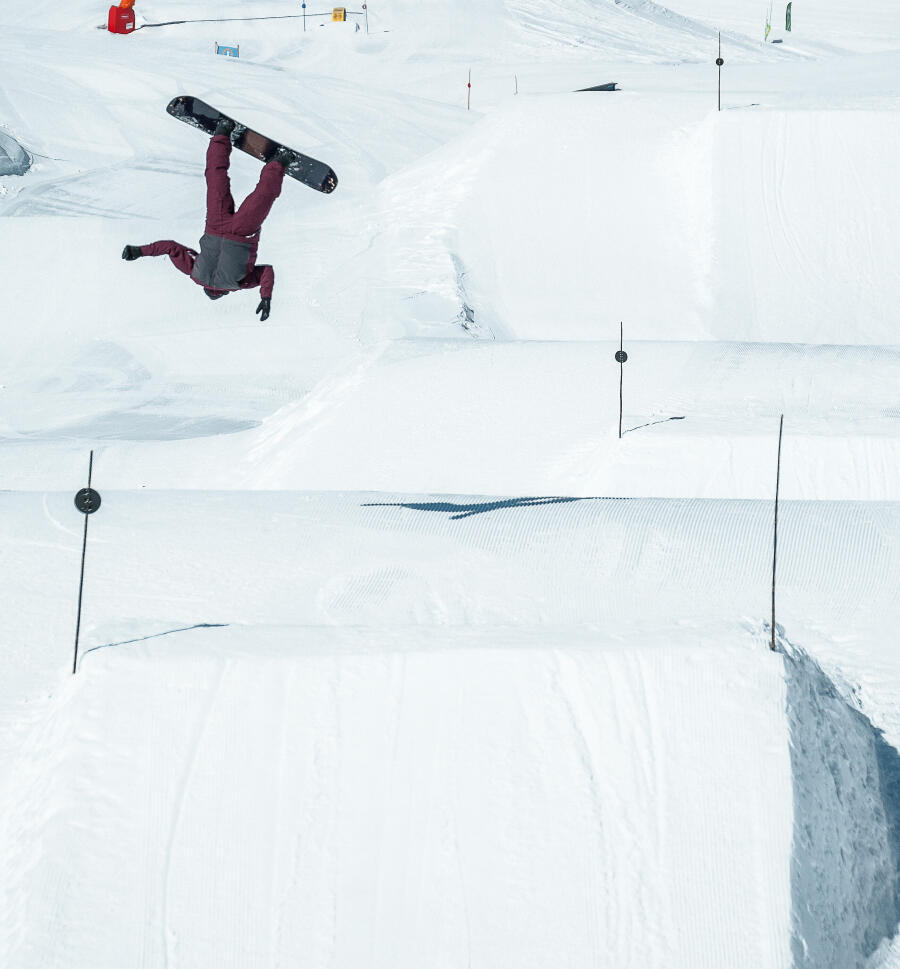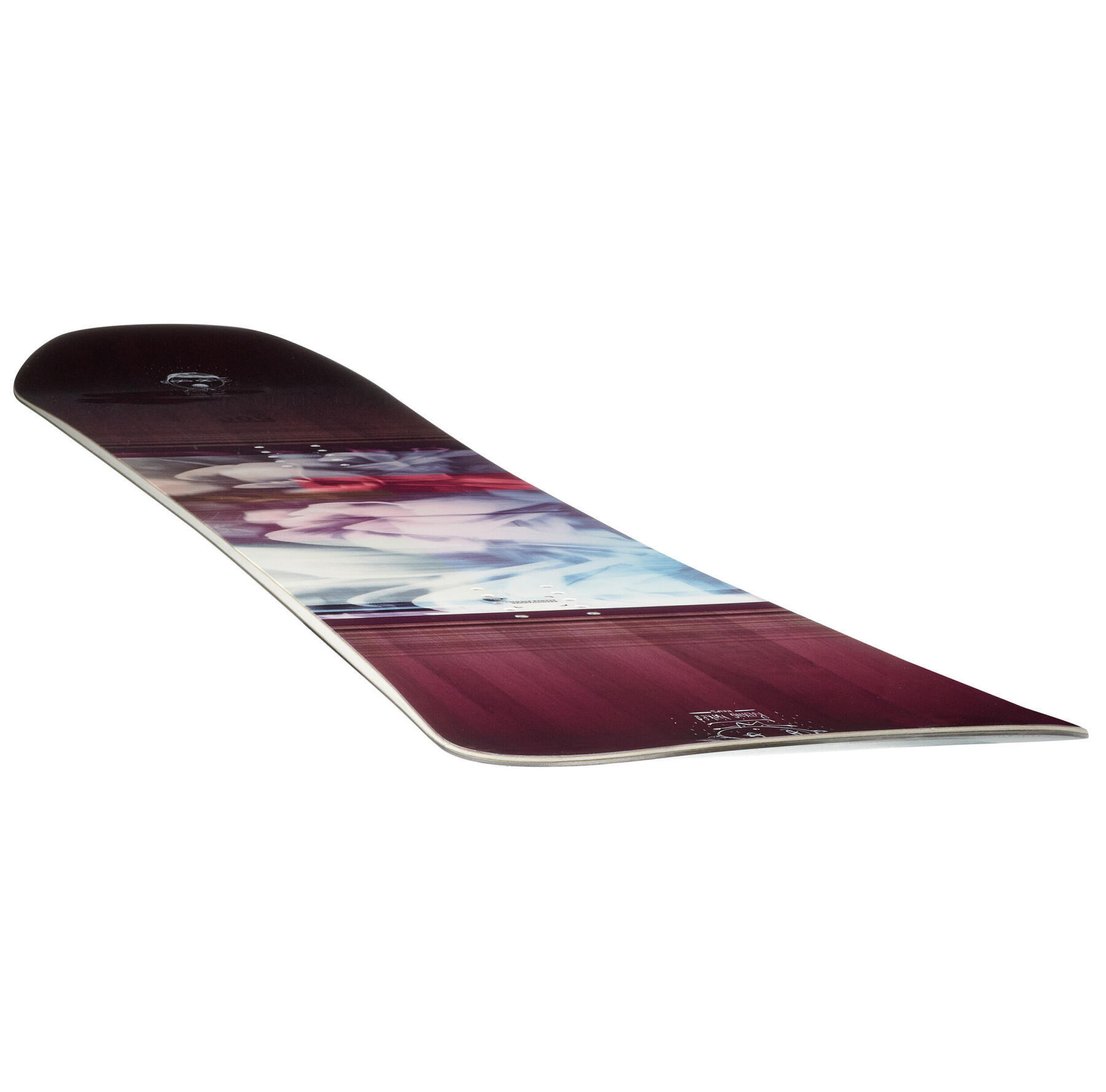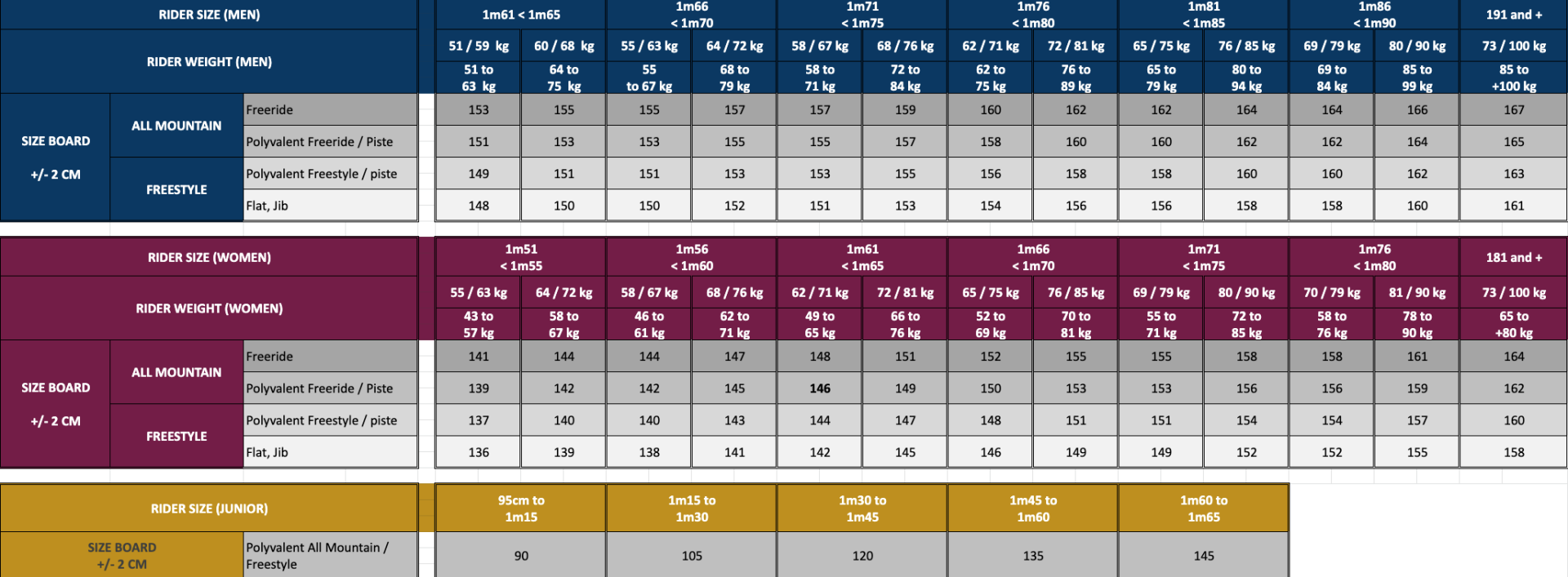2/ What’s my type of riding?
Ask yourself some simple questions:
Are you interested in going to the parks? Doing jumps, trying rotations (180° or more), and taking in the bumps just for fun?

Every snowboarder has his own favourite playground, his own level, requirements, riding style ... and so his own ideal snowboard! To choose the right snowboard, five main criteria should be taken into account: your level of ability, your riding style, your height, your weight, and your shoes size.

1. Tail
2. Nose
3. Centre
4. Bindings Mount Pattern
5. Base
6. Edges

1. Topsheet
2. Fibreglass
3. Rubber
4. Woodcore
5. Insert
6. Sidewall
7. Rubber
8. Edge
9. Fibreglass
10. Base
Ask yourself some simple questions:
Are you interested in going to the parks? Doing jumps, trying rotations (180° or more), and taking in the bumps just for fun?


Yes
Head off on a FREESTYLE OR JIB snowboard

No
Head off on an ALL MOUNTAIN, FREERIDE snowboard
Are you interested in riding in powder, looking for off-piste routes in the heart of nature?


Yes
Head off on a FREERIDE snowboard

No
Head off on an ALL MOUNTAIN snowboard

ALL MOUNTAIN
And if you haven't chosen your riding style yet or if you're super-versatile, then go for an equally versatile board so you can ride with your friends on and off-piste while doing whatever you want when you want with your snowboard...

- A perfectly symmetrical board between front and back.
- With its bindings perfectly centred on the board (we talk about 0 mm setback).
These boards will enable you can to go in both directions and make rotations as well as reverse manoeuvres easier. These snowboards are more fun and manoeuvrable.

- A board with a different front and rear, generally the front is longer and a little wider than the rear tip.
- Bindings position have a set back from the middle of the board (we’re talking about 10 mm, 20 mm or ...X mm setback depending on how far the bindings are moved back from the centre of the board).
These boards mean you can make better turns, offer improved grip on hard snow, and float better in powder! These snowboards are more stable at high speeds and have more grip.

- A combo between twin and directional snowboards.
- You can have a SetBack or a different flex between the nose and tail of the board.
- These types of boards are designed for fun-seeking shredders who want a board that can do it all.
Even though ALL MOUNTAIN snowboards perform better on and off-piste, you need to bear in mind that all FREESTYLE snowboards are increasingly versatile with very good on-piste/off-piste abilities.
Here are some guidelines to help you determine your snowboarding level:

Beginners
- I ride green to red slopes. The turns are skidded rather than cut.
- I’m starting to ride switch (backwards).
- I can do small jumps on a module with take-off and landing with a flat board.
FLEX: Go for a flexible snowboard, a forgiving board that will limit edge mistakes.

Intermediate
- I do cut turns with a small radius on hard snow or red / black slopes.
- I’m starting to string together switch turns (backwards).
- I can do 180° jumps.
- I can ride a 50/50 box (straight ahead).
FLEX: Go for a medium snowboard, which lets you go faster and have more grip while remaining easy to ride.

Advanced
- I can ride on any snow / all terrain, combining speed, trajectory, style and efficiency.
- I can ride down narrow corridors with a steep slope (35° or more).
- I can do a grab (catching hold of your board during a jump) on a medium table (4 to 6 metres) while remaining balanced in the air.
- I can do a boardslide box (snowboard 90° to the box) and perform a 360° on a medium table (4 to 6 metres).
FLEX: Go for a rigid snowboard suitable for people with a good level and/or good physical condition. Rigid torsion will ensure that the snowboard does not lose its curve at full speed, even on hard, frozen snow.

For FREESTYLE use:
Choose a fairly short board, 20 to 25 cm shorter than you are.
Hold your board vertically in front of you - it should come up to between your shoulder and your chin.
- Choosing a smaller board makes rotations and tricks easier.
- Choosing a longer one means you’ll be more stable at high speed and when landing a jump, and is recommended for people who are heavy for their height.
For ALL MOUNTAIN use:
Choose a board that’s 10 to 20 cm shorter than you are.
Hold your board vertically in front of you - it should reach between your shoulder (or base of your neck) and your chin.
- Choose a smaller one for greater ease of use. This is also recommended for people who are light for their height.
- Choose a bigger one for improved stability at high speed.

If your shoe size is 11 or bigger, choose a "wide snowboard", so your feet won’t dig into the snow in curves.
Above size 10, this isn’t necessary, but a wide board will be more comfortable.
To be well-equipped:

If you liked this article, please rate it. If you have any questions, you can ask them in the comments, and we’ll be happy to answer.
Choose your snowboard well, and enjoy riding!
(On behalf of the entire DREAMSCAPE team)

Snowboard equipment product manager at DREAMSCAPE and passionate about snowboarding.